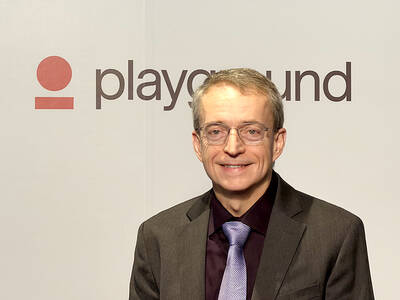Taiwan Semiconductor Manufacturing Co (TSMC) Chairman C.C. Wei (魏哲家) and the company’s former chairman, Mark Liu (劉德音), both received the Robert N. Noyce Award -- the semiconductor industry’s highest honor -- in San Jose, California, on Thursday (local time).
Speaking at the award event, Liu, who retired last year, expressed gratitude to his wife, his dissertation advisor at the University of California, Berkeley, his supervisors at AT&T Bell Laboratories -- where he worked on optical fiber communication systems before joining TSMC, TSMC partners, and industry colleagues.
Liu said that working alongside TSMC partners over the past 30 years has been a lifelong honor and that he could not have reached this moment without them.

Photo: CNA
Liu also thanked industry colleagues for their joint efforts in building an exceptional foundry ecosystem for the semiconductor sector.
For his part, Wei, the company’s current chairman, said that the award was not just for him personally; he dedicated it to the TSMC team, adding that it has been a great honor to work alongside so many outstanding colleagues at the company.
The Semiconductor Industry Association (SIA) announced in July that Wei and Liu have been selected as the 2025 co-recipients of the award, presented annually in recognition of a leader who has made outstanding contributions to the semiconductor industry in technology and/or public policy.
In a press release issued in July, SIA President and CEO John Neuffer said that Wei and Liu "are titans in our industry," having reshaped the modern semiconductor ecosystem -- both in the US and abroad -- and revolutionized chip manufacturing technology.
"Combined, these visionary leaders have brought more than 80 years of industry experience and expertise to bear while leading pioneering work to advance semiconductor innovation. We are thrilled to recognize Dr. Wei and Dr. Liu with the 2025 Robert N. Noyce Award for their groundbreaking work," he said.
TSMC founder Morris Chang (張忠謀) was the 2008 recipient of the award, which the SIA Board of Directors created in 1990 to honor the memory of Robert N. Noyce, co-founder of Intel and the SIA, according to the institution.
TSMC issued a statement in Taipei on Friday saying that the presentation of the award to Wei and Liu was highly significant, recognizing their visionary leadership and outstanding contributions, which have not only shaped TSMC but also advanced the global semiconductor industry.
TSMC said the award fully reflected the company’s ongoing efforts and steadfast commitment to innovation and its continuous pursuit of technological breakthroughs.
Other recipients of the medal in recent years included Advanced Micro Devices CEO Lisa Su (蘇姿丰) in 2020, NVIDIA CEO Jensen Huang (黃仁勳) in 2021, and Intel CEO Lip-Bu Tan (陳立武) in 2022, according to the institution’s website.

The number of Taiwanese working in the US rose to a record high of 137,000 last year, driven largely by Taiwan Semiconductor Manufacturing Co’s (TSMC, 台積電) rapid overseas expansion, according to government data released yesterday. A total of 666,000 Taiwanese nationals were employed abroad last year, an increase of 45,000 from 2023 and the highest level since the COVID-19 pandemic, data from the Directorate-General of Budget, Accounting and Statistics (DGBAS) showed. Overseas employment had steadily increased between 2009 and 2019, peaking at 739,000, before plunging to 319,000 in 2021 amid US-China trade tensions, global supply chain shifts, reshoring by Taiwanese companies and

Taiwan Semiconductor Manufacturing Co (TSMC, 台積電) received about NT$147 billion (US$4.71 billion) in subsidies from the US, Japanese, German and Chinese governments over the past two years for its global expansion. Financial data compiled by the world’s largest contract chipmaker showed the company secured NT$4.77 billion in subsidies from the governments in the third quarter, bringing the total for the first three quarters of the year to about NT$71.9 billion. Along with the NT$75.16 billion in financial aid TSMC received last year, the chipmaker obtained NT$147 billion in subsidies in almost two years, the data showed. The subsidies received by its subsidiaries —

Shiina Ito has had fewer Chinese customers at her Tokyo jewelry shop since Beijing issued a travel warning in the wake of a diplomatic spat, but she said she was not concerned. A souring of Tokyo-Beijing relations this month, following remarks by Japanese Prime Minister Sanae Takaichi about Taiwan, has fueled concerns about the impact on the ritzy boutiques, noodle joints and hotels where holidaymakers spend their cash. However, businesses in Tokyo largely shrugged off any anxiety. “Since there are fewer Chinese customers, it’s become a bit easier for Japanese shoppers to visit, so our sales haven’t really dropped,” Ito

OUTLOOK: Pat Gelsinger said he did not expect the heavy AI infrastructure investments by the major cloud service providers to cause an AI bubble to burst soon Building a resilient energy supply chain is crucial for Taiwan to develop artificial intelligence (AI) technology and grow its economy, former Intel Corp chief executive officer Pat Gelsinger said yesterday. Gelsinger, now a general partner at the US venture capital firm Playground Global LLC, was asked at a news conference in Taipei about his views on Taiwan’s hardware development and growing concern over an AI bubble. “Today, the greatest issue in Taiwan isn’t even in the software or in architecture. It is energy,” Gelsinger said. “You are not in the position to have a resilient energy supply chain, and that,